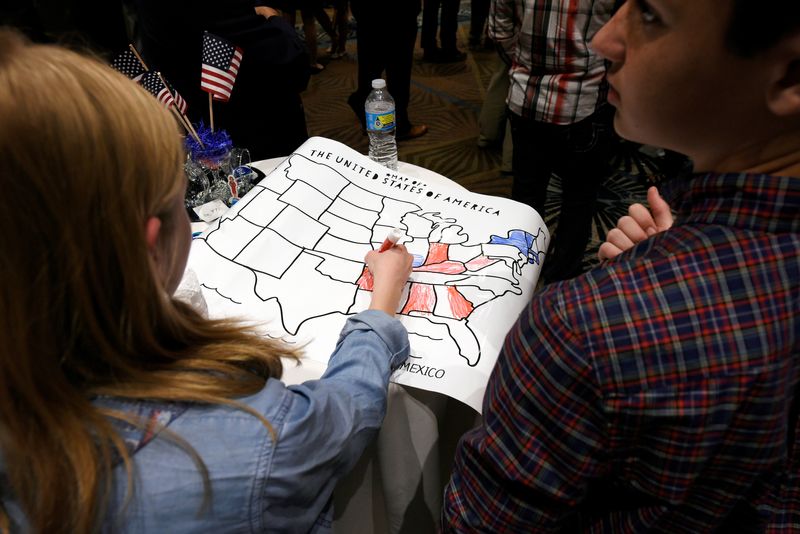In win for Republicans, North Carolina court allows partisan gerrymandering
2023.04.28 18:03

© Reuters. FILE PHOTO: A girls colors an electoral map of the United States in either red or blue as returns are announced for the U.S. general election at Republican Governor Pat McCrory’s election-night party in Raleigh, North Carolina, U.S. November 8, 2016. REU
By Joseph Ax
(Reuters) -North Carolina’s highest court on Friday ruled that state law does not bar lawmakers from drawing congressional and state legislative maps for partisan benefit, boosting Republicans’ odds next year of maintaining their narrow majority in the U.S. House of Representatives.
The decision – divided along party lines – appears to clear the way for the Republican-controlled legislature to craft new, political advantageous maps for the 2024 elections, which could net them as many as four additional U.S. House seats.
Republicans currently control the 435-member House by a narrow nine-seat margin.
Friday’s ruling vacated the court’s previous decision, issued barely more than a year ago when Democratic judges controlled the court, that had found partisan gerrymandering violated the state constitution.
After the court threw out a Republican-drawn map, the two parties split the state’s 14 seats evenly in November under a court-approved map.
In the same election, Republicans flipped two Democratic seats on the North Carolina Supreme Court, securing a 5-2 conservative majority. In February, the new majority agreed to rehear the redistricting case at the request of Republican lawmakers, an extraordinarily rare move in the court’s history.
In a 146-page opinion on Friday, Chief Justice Paul Newby noted that the U.S. Supreme Court had also found that federal courts have no jurisdiction to address partisan gerrymandering.
“Our constitution expressly assigns the redistricting authority to the General Assembly subject to explicit limitations in the text,” Newby wrote for the majority. “Those limitations do not address partisan gerrymandering.”
In a scathing dissent, Justice Anita Earls, a Democrat, accused the court’s Republicans of pursuing their own political agenda at the expense of voters’ rights, calling it one of the court’s “darkest moments.”
“Today, the Court shows that its own will is more powerful than the voices of North Carolina’s voters,” she wrote.
‘WORST DECISION EVER’
Voting rights groups decried the decision as an attack on democracy itself.
“I think it’s the worst decision the North Carolina Supreme Court perhaps has ever made,” Bob Phillips, executive director of Common Cause North Carolina, told reporters.
In a statement, Phil Berger, the Republican leader in the North Carolina Senate, said the ruling affirmed “that our constitution cannot be exploited to fit the political whims of left-wing Democrats.”
In a separate decision, the court’s conservative judges also upheld a Republican-backed voter identification law that the court’s previous Democratic majority had struck down as racially discriminatory.
Friday’s ruling also calls into question whether the U.S. Supreme Court will issue a decision in one of the year’s most important cases.
North Carolina Republicans had appealed last year’s redistricting decision to the U.S. Supreme Court, where they advanced a once-fringe legal theory that has gained traction in conservative legal circles: the independent state legislature doctrine.
Under the theory, state courts have no authority to review lawmakers’ actions regarding federal elections, including redistricting and voting rules.
Democrats have warned that adopting the theory would allow Republicans to enact new restrictions that undermine fair elections, while Republicans contend it would rein in state judges intent on usurping lawmakers’ power.
When the North Carolina court agreed to rehear the case, however, the U.S. Supreme Court asked for additional briefing from the parties about whether it still had legal jurisdiction over the matter.
Now that the North Carolina court has vacated the decision that formed the basis for the U.S. Supreme Court’s review, the U.S. Supreme Court may conclude it no longer has a role to play in resolving the matter.








